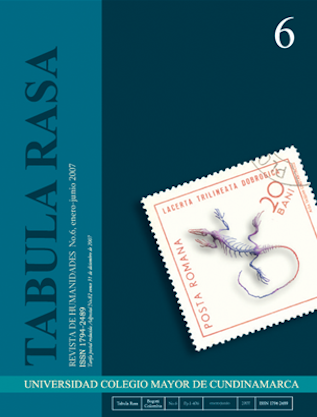«Hacer vivir y dejar morir»: Foucault y la genealogía del racismo
«Live and let die»: Foucault and the genealogy of racism
Mostrar biografía de los autores
Este artículo aborda el seminario de Foucault de 1975-6 titulado Il faut défendre la société, o Defender la sociedad. El artículo no pretende resumir el curso, sino más bien discernir una constelación de puntos de partida radicales en el pensamiento de Foucault. Nos enfocaremos en la fuerte crítica a la hipótesis represiva del poder o hobbesiana, y el desarrollo de una concepción productiva o genealógica del poder. Esto está conectado con la cuestión del papel productivo del racismo en una nueva forma de poder y soberanía, una que Foucault denomina biopoder. El racismo es analizado en términos de cómo reintroduce en la soberanía biopolítica el poder de matar y de hacer morir, un poder que se ha distanciado de la soberanía en tanto se ha convertido en una forma de poder pastoral, como Foucault argumenta luego en sus conferencias. Finalmente, discutimos las formas en las cuales el análisis inmensamente original de Foucault en racismo puede ser utilizado en el contexto estadounidense para comprender la reiteración y virulencia de actos de violencia contra los sujetos racialmente marcados, y como esto desafía la filosofía política de nuestros tiempos.
Visitas del artículo 365 | Visitas PDF 105
Descargas
Agamben, Giorgio. 1998. Homo Sacer: Sovereign power and bare life. Stanford: Stanford University Press.
Burchell, Graham, Colin Gordon y Peter Miller. 1991. The Foucault Effect: Studies in Governmentality. Chicago: University of Chicago Press.
Dean, Mitchell. 2001. “‘Demonic Societies’: Liberalism, Biopolitics, and Sovereignty” en Thomas Blom Hansen y Finn Stepputat, (eds). States of Imagination: Ethnographic Explorations of the Postcolonial State. 41-64, Durham, NC: Duke University Press.
Dray, Phillip. 2002. At the Hands of Persons Unknown: The Lynching of Black America. Nueva York: Random House.
Foucault, Michel. 2000. Power. Essential Works of Michel Foucault. 1954-1984. Volumen 3, editado por James D. Faubion. Nueva York: New Press.
Foucault, Michel. 1997. ‘Il faut défendre la société’: Cours au Collège de France (1975-1976). París: Gallimard/Seuil.
Lemke, Thomas. 1997. Eine Kritik der politischen Vernunft: Foucaults Analyse der modernen Gouvernementalität. Berlín, Hamburgo: Argument Verlag.
Lifton, Robert Jay y Greg Mitchell. 2000. Who Owns Death? Capital Punishment, the American Conscience, and the End of Executions. Nueva York: William Morrow.
Martin, Luther H., Huck Gutman y Patrick H. Hutton. 1988. Technologies of the Self: A Seminar with Michel Foucault. Amherst: The University of Massachusetts Press.
McCarthy, Thomas. 2001. “Political Philosophy and Racial Injustice: From Normative to Critical Theory” Manuscrito en página principal de internet de Northwestern University. http://www.philosophy.northwestern.edu/people/facDocuments/
Marks, John. 2000. “Foucault, Franks, Gauls: Il faut defender la socièté: The 1976 Lectures at the Collège de France”. Theory, Culture & Society, Vol. 17, No. 5 (Octubre 2000): 127-147.
Mendieta, Eduardo. 2004. “Plantations, Ghettos, Prisons: US Racial Geographies” Philosophy & Geography, Vol. 7, No. 1, (2004): 43-60.
Mendieta, Eduardo. 2002. “There are no Races, Only Racisms: On Leonard Harris’ Racism (Humanity Books, 1999)”. Continental Philosophy Review, Vol. 35, No. 1 (2002): 108-115.
Miller, James. 1993. The Passions of Michel Foucault. Nueva York: Simon & Schuster.
Morris, Meaghan y Paul Patton. 1979. Michel Foucault: Power, Truth, Strategy. Sidney: Feral Publications.
Ojakangas, Mika. 2001. “Sovereign and Plebs: Michel Foucault Meets Carl Schmitt” Telos, No. 119 (Primavera 2001): 32-40.
Proctor, Robert. 1988. Racial Hygiene: Medicine under the Nazis. Cambridge, MA: Harvard University Press.
Stoler, Ann Laura. 1995. Race and the Education of Desire: Foucault’s History of Sexuality and the Colonial Order of Things. Durham, NC: Duke University Press.




